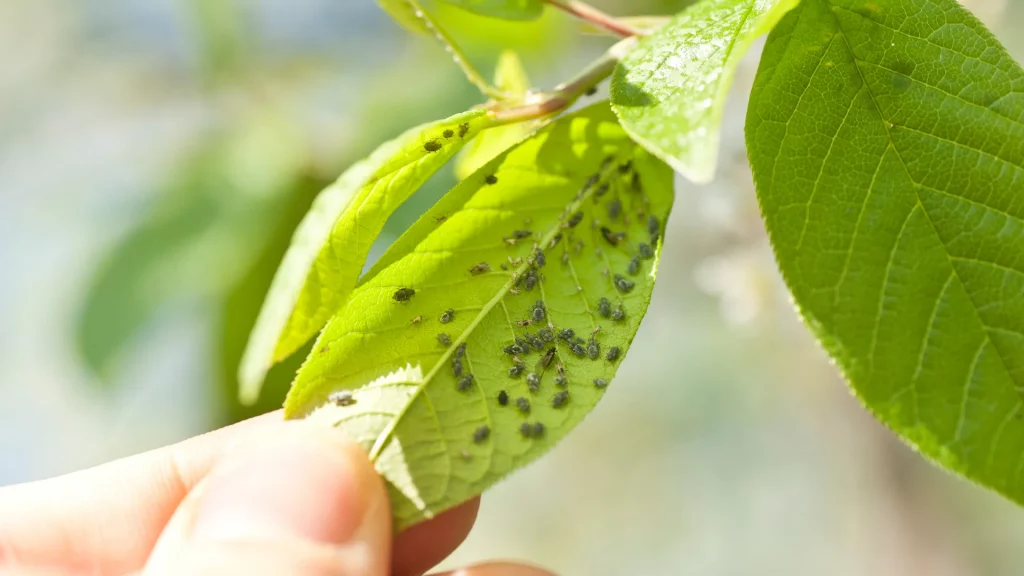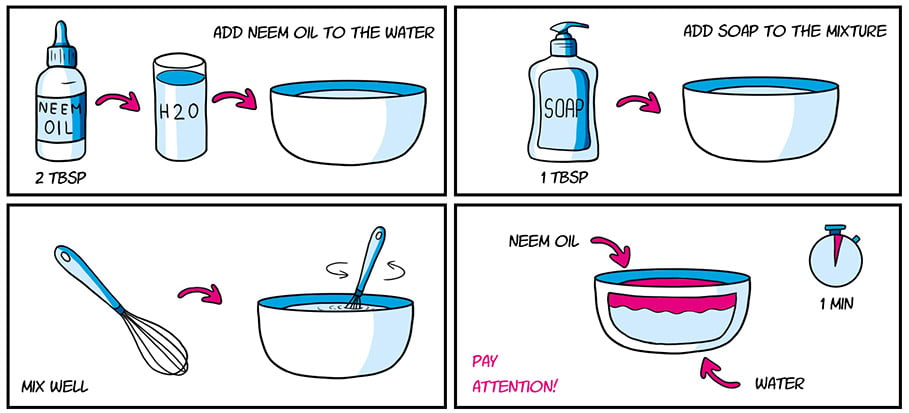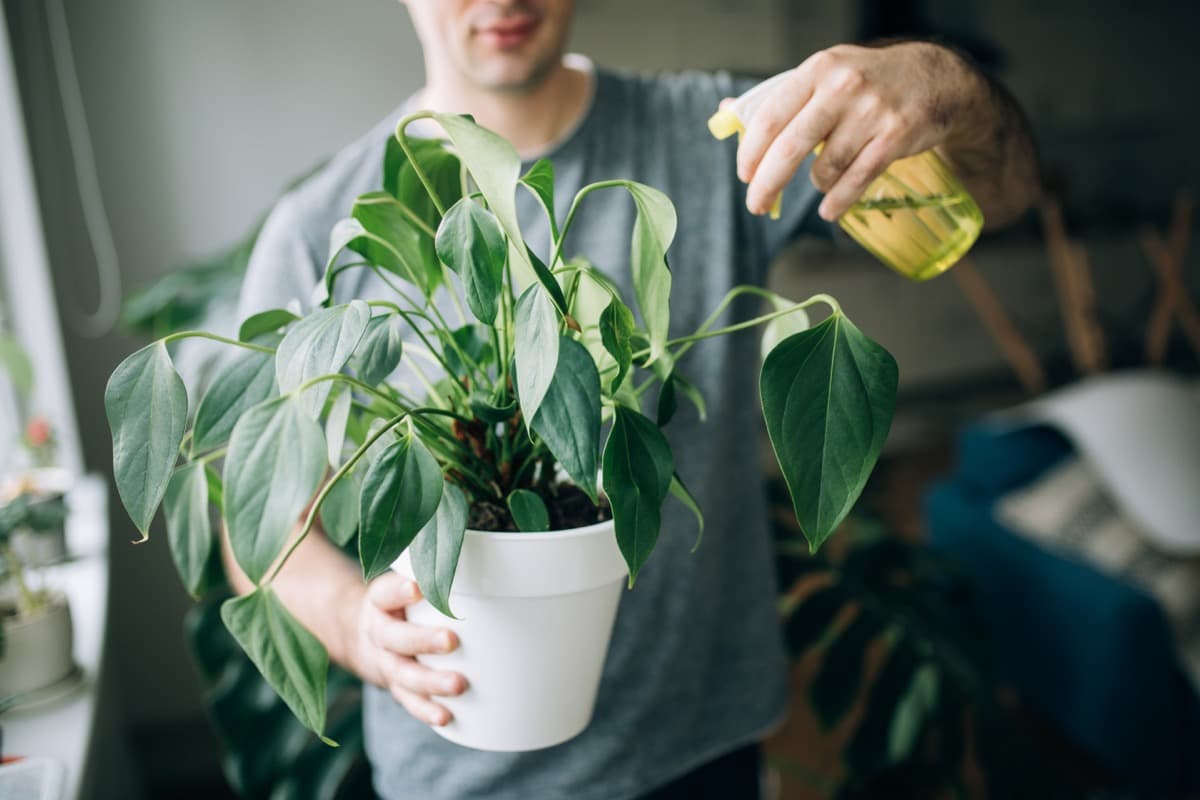Table of Contents
The neem oil is extracted from the seeds of the neem tree. This vegetable oil is a yellow-brown-colored substance with a bitter taste and a pungent garlic-sulfur-like odor. Neem tree parts, in general, produce phytochemicals and have antibacterial, antifungal, and antiparasitic qualities that shield plants from infestations.
Neem oil is organic, biodegradable, and works effectively even when the plant is badly infected by pests. It is not a mere preventive measure but an antibiotic of sorts for the plant to fight diseases during its life span. Not only for plants, but neem oil has also proven to be extremely beneficial for the human body.
However, if you want to use neem oil in your garden because you have been pestered by pests, In this article, we will learn about when to use neem oil for plants, why to use neem oil, and how it can be used for the best results.
When to Use Neem Oil on Plants?
Neem oil for plants works effectively against existing infestation. Therefore, it is not only a mere preventive measure.Consequently, you must apply the oil when the insects are young in order to disturb their growth and feeding cycles to prevent things from getting worse.

Neem oil takes does not show its effect immediately. The best time to spray neem oil is either during dusk or dawn, as it can be detrimental to helpful insects that come into contact with it later on. Neem oil must not be sprayed during the day because it is quite strong in nature, and if exposed to sunlight, this neem oil for plants can even burn the foliage. Therefore, apply frequently in the beginning as a preventive measure against pests. Spray neem oil soaks once in three weeks and neem foliar spray once in two weeks for the best results.
Neem oil must not be sprayed in extreme climates, on tender saplings, or if your plants are close to a beehive or water body, as it can be toxic for aquatic animals.
Why Use Neem Oil on Plants?
Neem oil is particularly effective against soft-bodied insects and pests that chew as well as suck leaves. Neem oil can be used at any and every stage of development of a plant. However, there are multiple other reasons for using neem oil, and they are as follows:

1. Biodegradable
Neem oil is biodegradable and organic as it is extracted from the neem tree. The oil is extracted by crushing the seed of the tree and mixed with water or any kind of solvent in the end. Make sure that you dilute neem oil with a solvent in the end, as concentrated neem oil can be very strong for delicate plants. Neem oil is a non-polluting oil. Since the oil is a biodegradable product, it does not cause air pollution, soil pollution, or even water pollution. The half-life of azadirachtin in soil spans a period of 3-44 days, and in water, it lasts from 48 minutes to 4 days, whereas on the leaves, it lasts the least and breaks down in a day or two.
2. Safe for Animals
Synthetic pesticides are often harmful to animals, and these pesticides often build up in the surrounding environment. They leave toxic residue behind, which is very harmful to all kinds of animals. Neem oil, however, is safe for pollinators, birds, and mammals as it does not leave any kind of residue. It degrades quickly during rainfall and under UV rays. It is extremely effective in working against insects with soft bodies that suck leaves and other chewing insects.
Neem oil for plants is harmless to bees, ladybugs, and butterflies. Since plants have nectar that attracts delicate pollinators, synthetic pesticides can be very harmful and toxic to them. An organic insect repellent like neem oil can kill pests directly by entering their body, as an egg, or even at a very early stage after birth.
4. Control Insects at Any Stage of Its Growth
The azadirachtin compound present in neem oil can kill an insect at any stage of its life, i.e., it can kill a fully grown insect, larvae, and even an egg. It will force the insect to stop eating the leaves. It works as an antifeedant, as a hormone disruptor, and can also smother the insect.
5. Can Control Nematodes
Neem oil for plants can control nematodes by preventing them from hatching. They can be very difficult to control. However, certain kernels have been shown to provide good control over root-knot nematodes.
6. Safe for Useful Earthworms
Earthworms are very beneficial for the soil because their fecal waste is rich in potassium, phosphorus, and nitrogen. Earthworms can also be beneficial when it comes to improving the aeration of the soil. They tunnel through the soil, which makes it easier for rainwater and air to reach the roots more efficiently. Even their dead bodies make the soil rich in quality and add to the organic quality of the soil.
7. Used as a Foliar Spray
Foliar spray is good for plants as it helps them to absorb water, minerals, and nutrients. It makes it easier for the plant to breathe by cleaning the stomata. Neem oil can perform the function of a foliar spray or a ‘leaf shine’ spray which can be extremely valuable to indoor plants and hydroponic growers. It protects the plant from fungal infection, spider mites, and other leaf diseases.
8. Control Lawn Grubs
If you want to control grubs in your lawn and if your lawn is infested with Japanese beetles, neem oil can work as an excellent repellant. When mixed with water, neem oil can inhibit the egg-laying process and their growth. This process can be done once a month in the summer season.
9. It Can Be Used on Indoor Plants
Neem oil is an excellent product for maintaining house plants. It is highly effective when it comes to treating scale. Mix half a teaspoon of neem oil with a teaspoon of liquid soap and a liter of water to make the most effective and eco-friendly insecticide for indoor plants. Neem oil is completely safe for greenhouse use. The greenhouse is the perfect breeding place for mites, aphids, scale insects, and even whiteflies. It works as a preventive measure and also as a controlling measure for existing pests that have infested your plants.
10. A Good Fungicide
One of the most common fungal diseases that attack a plant is powdery mildew. Neem oil can tackle the disease by preventing the germination of fungal spores into the leaf tissue. It cannot completely cure a plant of the disease, but it can stop the disease from spreading to the healthy tissues of the plant.
11. It Works as a Bactericide
Most often, plants are infected by bacterial diseases like fire blight that infects fruit trees belonging to the Rosaceae family. The disease causes the plant leaves to wilt and appear burnt. Using neem oil for plants is an effective solution, as the methanolic extracts of neem leaves have antibacterial activity against pathogenic and reference strains.
12. Easy to Apply
It is very easy to apply neem oil on plants and is harmless if exposed to humans, unlike any other synthetic pesticide. Dilute some oil with water to clean your leaves to give them an extra shine, and you can even mix this mixture with soil for better root growth. It is not a very time-consuming process either, as you can spray neem oil on plants while watering them. This will save you time and make the solution get absorbed by the roots immediately. Once it reaches the leaves, any insect that bites the leaf will die immediately.
13. Insects Do Not Become Resistant to It.
It is often discovered that insects, pests, and animals become resistant to chemical pesticides. However, when it comes to biopesticides like neem oil, it has been discovered that pests never develop strong immunity against them.
14. Available in Many Formulas
Neem oil is available in a number of forms or varieties, which makes its usage more convenient. It can be dissolved with insecticidal soap to improve its performance as a pest killer. It is also available as wettable powders, granules, dust, and also as emulsifiable concentrates.
15. Can Protect Herbs
Azadirachtin in neem oil is poisonous to pests if ingested but is harmless to humans. It can be easily sprayed on fruits, vegetables, and delicate leaves of herbs. However, do not use neem oil on herbs a day before they have to be consumed, as it is quite strong for the human body.
How to Use Neem Oil on Plants?

- It can be used as a dormant spray. Spray neem oil on plants when they are dormant to kill overwintering garden pests and eggs. Spray the plant with neem oil mixture on a dry day when there is no wind and the minimum temperature is 40 degrees Fahrenheit. Mix concentrates as directions specify because they will not dissolve as an oil, nor will the compounds.
- It can be used as a foliar spray or leaf shine. Spray neem oil directly on the leaves during the plantation season to prevent pest infestation and diseases. Azadirachtin is extracted from neem seed and combined with soaps and other organic-listed compounds in insect spray.
- It can be used as a soil drench: To use neem oil as a soil drench, dilute it with some water and pour it into the ground or mix it with your potting soil. This mixture can be used for the proper growth of indoor plants and outdoor plants to treat fungal diseases, insects, or larvae that are present in the soil and even eradicate fungus gnats.
- Water-soluble neem oil is also available as a stand-alone extract to be used against nates, moth larvae, and beetles. It can effectively disrupt pests’ hormones that prevent breeding, growth, and feeding. Also, before spraying the oil on the entire plant, perform a patch test so that you can judge the potency of the oil.
Conclusion
Persistence is key, as it will take some time to work. Neem oil is strongly advised over synthetic herbicides and insecticides when used on herbs or plants that have to be consumed by you. Even if it is your flower bed that has been infested by pests, neem oil is a better option than artificial pesticides because the latter is a significant source of air pollution and soil pollution. Always remember to dilute neem oil with water before spraying it on plants, or else it can be too potent for the delicate foliage and leaves.
Do offer us more suggestions in the comment section on utilising neem oil to improve the health and appearance of the plants in the kitchen garden.
Frequently Asked Questions
On Which Plants Can Neem Oil Not Be Used?
On newly transplanted or stressed plants because it can damage by burning the foliage. Neem oil cannot be sprayed on herbs like basil, dill, cilantro, caraway, marjoram, oregano, parsley, or thyme. Neem oil cannot also be sprayed on delicate or wispy leaves like arugula, peas, and spinach.
What Is a Neem Cake?
Neem cake is made by drying neem kernels and making a powder out of them. Neem cakes are composed of potassium humate, ammonium humate, turfy soil, and a few other components that can enrich the soil and make it healthier. It is one of the best biofertilizers used by farmers as it controls pests and also helps the soil in retaining moisture.
What Is the Difference Between Neem Oil and Horticultural Oil?
Neem oil is a type of horticultural oil. When it comes to usage, neem oil is meant to handle established infestations much better, whereas horticultural oil works better against fungus gnats and other such small flies. Therefore, to decide which oil out of the two have to be used, it is a must first to analyze your problem and then decide. Sometimes, both oils have to be used with liquid soap for the best results.
On Which Plants Do Neem Oil Not Work?
Neem oil is not meant for plants with rough surfaces or delicate leaves. It should not be sprayed on plants with fuzzy leaves like those of Bear Paw Jade, dusty Miller, green Goddess, hyacinth, fountain grass, or angel’s hair artemisia, as it can harm beneficial insects.





